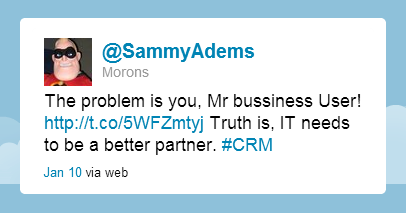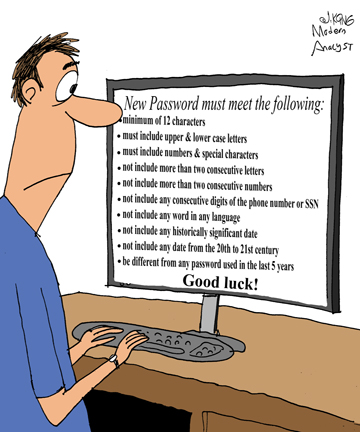Salespeople have a reputation for being just about the worst people to work with when building software. Being in the CRM space myself, this is a constant topic of conversation. Usually the focus is around user adoption, as opposed to mundane complaining about salespeople caring about nothing but their commission checks. But it’s true, that’s all they care about. That’s why when pitching CRM systems to salespeople the pitch always revolves around increased sales\commission. “This will save you time, so you can do more of what you do best, selling!” or “Not only will you have greater visibility into what your customers are interested in, but when they are interested so you can strike while the iron is hot!”. The thing is salespeople don’t buy CRM systems. Sales managers do. This stuff that we are telling the salespeople is usually post sale, during training, when we are focused on user adoption. Good salespeople know when smoke is being blown up there a**, and this is a primary reason why CRM systems have abysmal user adoption rates (though it has gotten a lot better in recent years). Salespeople know that all this extra data entry is primarily for the sales manager’s reporting needs.
The traditional advice is that companies should seek a system champion. An evangelist, who is going to sell the system to users, and if he fails simply force the users to use the system. I feel this is somewhat misguided; systems that work shouldn’t have to be sold to users. When presented to users, it should have such a clear advantage over current processes, that the users themselves evangelize the system. Yet, how often do you hear business users praising the systems they work with? It’s almost unheard of.
It’s my belief that IT workers need to take ownership of this. For too long we have left business managers\owners to evangelize technology….
In a perfect world, up front at the start of such a project, the technology team would tell the sales manager, “If you want your reports, your sales people have to do some data entry, lets figure out a way to make the CRM system work for them, so they want to do the data entry because they benefit from that data too. Now let’s work together to figure out how to do that.” But this is rarely the advice given.
Some time ago, I read a great article, in which the author (Gene Marks) is “sick of the whining”, he tells business owners to take responsibility for their technology and getting the most out of it, he says:
“the problem with your CRM system isn’t usually about your CRM system. It’s about you. It’s the way it’s been setup. It’s the way it’s been implemented. It’s the way it’s managed. Wake up. Stop your finger pointing. Enough with the whining. Look in the mirror. If you want your CRM system to succeed, then take a deep breath and do these three things….“
Gene is 100% correct on this, but what really hit home in this article is the following quote:
“To succeed, you also need someone like Kathy. Hire that person or re-organize to create time for that person. This should not be an IT person either – those people are not suited for this task.”
Ouch. What really hurts about this is that it’s true. IT people suck at questioning business requirement correctness and suck even worse at questioning business requirement usefulness. The below image is from the ITSM Trends 2012: The State of the Dev-Ops Union report
91% of business system users don’t consider IT to be a true business partner, 91%! Even if this number is off by 20 points, it’s an embarrassment. We as technology professionals should be ashamed. Maybe business owners share some of the blame here. But the bottom line is, we work for them, not vice-versa. It’s our job to keep them happy, and we are failing miserably.
For 10 years, I worked in professional services. About 2 years ago, I joined a Fortune 500. I always knew this was a problem, but for me it was always a good problem. If I had to make a back of the napkin estimate, I would estimate that 75% of our Fortune 1000 customers worked with us for no other reason they when working with a vendor they didn’t have to deal with internal IT people.
Professional services firms understand how important it is to be a strong partner with their customer . Product companies understand this as well, probably even more so than professional services firms. All too often internal IT staff looks at business users as peers as opposed to customers. This is what I feel is at the root of this problem. If IT looked at business users as customers they would make it their business to know everything there is to know about their customer and bend over backwards to help them achieve their goals.
Internal IT departments need to get on the same page as professional services firms and product firms when it comes to understanding business and only then can they provide proper guidance on the use of technology. They need to act as an advisor on business matters (not simply technological ones), they need to accept that business users don’t understand how technology works and therefore don’t always know what they need. Today internal technology people simply don’t know enough about the business they support to properly guide them.
Enter the Business Analyst, the individual who doesn’t fully understand the business or the technology. Most often the business analyst is reduced to a middle man between business and IT, not allowed to think but only to ask and document. More often than not the technology team understands the business rules better than the business analyst. I can’t count how many times I had to explain the intricacies of a formula or data integration to a business analyst only to get a blank stare back. Often (I know I have had to many, many times) a developer needs to compose an email for the business analyst asking a very detailed question, only to have him\her forward it along to the business owner. A business analyst is not the solution. It’s not surprising that has come up on P.SE, see: “How much system and business analysis should a programmer be reasonably expected to do?“
I think the solution is clear. IT people need to take responsibility for understanding the intricate details of the business; it is my belief that any IT person should be able to conduct the job of the person they are writing a system for with a reasonable level of competency. Yes, if you are writing accounting systems you should be able to perform the job of an accountant. Yes, if you are writing marketing systems you should be able to run a simple marketing campaign.
This is the level of knowledge needed to build proper systems, and is the only way you, as an IT professional will understand the psychology of your user and can be confident that you are not only meeting the business requirements, but that you are meeting the intent of the business requirements. This is the only way to insure that you are building systems are usable by your target audience, that your users want to use.
This is what I believe is what needs to happen to restore the broken relationship between internal IT departments and business users. It starts with you… step up, learn your industry, it will make you a better IT professional.
One final point, an anecdote really… Recently one of my old clients asked me help him to look into an issue with a Gift Card module I wrote for them years back. The system had worked flawlessly for years, until one day a customer complained that he didn’t receive one of his gift cards. While investigating I came across something very odd, the customer was buying gift cards with gift cards, over and over again… really bizarre. At first I thought, maybe his gift card was about to expire so he found a loophole, to extend the expiration. But no, he was buying gift cards using gift cards he bought the day before!! W.T.F.! This is what caused the glitch. I fixed it and went on with my day. But this odd behavior was bugging me, why would someone use a gift card to buy another one? Few days later I was talking to another person who worked for that same client and told her of the odd set of transactions. She immediately knew what this person was doing. A few weeks prior the Co joined one of those “Cash Back” affiliates, so basically this person signed up with the cash back affiliate, and every time he used the gift card to buy another gift card he made 1% of the gift card value! So basically kept turning over the same $100 gift card making 1$ on each turnover! That’s one smart SOB! Anyhow the point is understating the business is also an important part of system security. Perhaps I knew a bit more about the marketing habits if this retailer, this sort of “fraud“ could have been prevented.
Recommended Reading: Quantum: Einstein, Bohr, and the Great Debate about the Nature of Reality
Filed under Uncategorized




It’s awesome when you find somebody who can actually keep up with everything at once, someone who can keep all the balls up in the air. But, most people can’t do it. You can tell, because if they could they would and then demand Mad Bank. “Make everybody do twice as much stuff!” is not a solution for anything.
I like your article and it proposes an empowering message, however it is a little naive. For sales/business to be a true partner with IT implies that the sales/business folks don’t habitually let the IT folk down. To be frank, my entire career I have witnessed myself and my peers be mercilessly persecuted, blamed and despised with burning hate for the reasons that IT service is expensive and viewed and treated as a cost center.
The reason they look to expensive consultants and vendors as opposed to internal IT is because they tell them what they want to hear, that IT is easy, and is a product you can buy, and that you don’t have to spend your precious time helping us gather requirements ad nauseum… just give us a vague idea of what you want and boom, 10 months later you have your awesome product. They pretend to be business partners too until they find out the software isn’t what they wanted and they get the same blame and persecution.
Speaking for a distressed internal IT department, we DO understand the business better than the vendors and we DO care about the company. Sometimes we are going to get it wrong though when you hold us in so little regard that you can’t give us an hour of your week to answer a few questions about your scatter-brained chicken scratch that you gave us to work with. Sometimes we have to guess and we get it wrong.
The organizations that understand that business folk must invest time and attention to IT are WILDLY SUCCESSFUL. The others are riddled with IT failures. The problem is one of management and leadership culture not of IT.
“IT people need to take responsibility for understanding the intricate details of the business..” That is a fact. It’s an IT job.
When the technology and the business knowledge are divided, you have a situation where no one is an expert. You get two versions of the same story and neither one makes any sense.